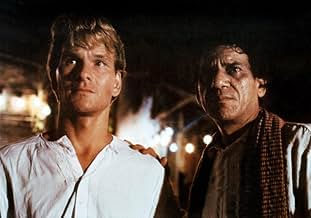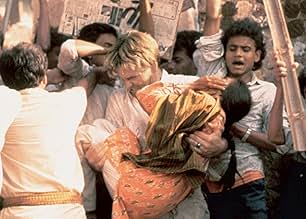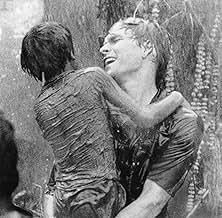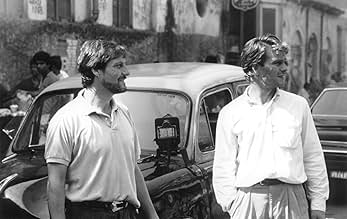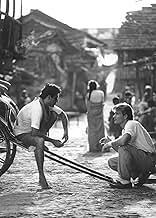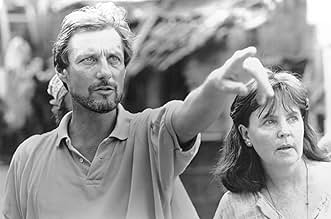PUNTUACIÓN EN IMDb
6,5/10
5,8 mil
TU PUNTUACIÓN
Tras perder su granja a un prestamista, la familia Pal llega a la ciudad de Calcuta buscando una vida mejor, y sobretodo queriendo obtener una dote para su hija Amrita, en edad de casarse.Tras perder su granja a un prestamista, la familia Pal llega a la ciudad de Calcuta buscando una vida mejor, y sobretodo queriendo obtener una dote para su hija Amrita, en edad de casarse.Tras perder su granja a un prestamista, la familia Pal llega a la ciudad de Calcuta buscando una vida mejor, y sobretodo queriendo obtener una dote para su hija Amrita, en edad de casarse.
- Premios
- 1 nominación en total
Argumento
¿Sabías que...?
- CuriosidadesAmongst the problems that beset the production were fire-bombings, mass demonstrations, media criticism, accusations of murder, a skyrocketing budget that eventually settled at the twenty-seven million dollar mark, and Warner Brothers' 11th hour pullout that nearly bankrupted the producers.
- PifiasThe school girl in the rickshaw gets dropped daily to St. Xavier's School on Park Street - which is an all boys school.
- Citas
Hasari Pal: All that is not given is lost.
Reseña destacada
A child dies on an operating table in a Texas hospital. The surgeon, Max Lowe (Patrick Swayze), abandons his practice after the fatality and travels to Calcutta, leaving painful memories behind him. At the same time, in the Indian province of Bihar, Hasari and his family are quitting the land. Two years of drought have reduced them to despair, and now they are drifting to the city, hoping to make a new life there.
The story of the film is that of an impoverished community in Calcutta's backstreets, and how with Max Lowe's help the poor people learn to throw off the yoke of oppression. Max gives of his time and talent, and in return these simple folk teach him new perspectives, and enable him to come to terms with his own regrets.
This film is an example of American insensitivity at its worst. It is extremely patronising in its treatment of Indian society and crude in its handling social and moral issues. The film fails utterly to appreciate that a social system that has existed for thousands of years might not need 'straightening out' by a young man from a 200-year-old culture. All the standard American cliches are trotted out. People are urged to 'stand up and be counted', and to 'make choices in their lives'. Individualism and self-reliance are trumpeted brainlessly, as if they were eternal truths. This is the arrogance of youth. American exporters of films would do well to remember that there are ways of living that happen to be distinct from their own - and far wiser.
The plot is brain-numbingly simplistic. An evil Indian 'godfather' and his (even more evil) son are terrorising the City of Joy. Max preaches rebellion to the local people, exhorting them to reject the feudal system by which they have lived since time immemorial. He has been in India for three weeks, but he know best. The film blithely ignores three essential realities, because they happen to be inconvenient. Firstly, street dwellers such as these have to work too long and too hard, and are too worn down by malnutrition, to stage rebellions and construct new clinics on a foreigner's whim. Secondly, even if an age-old feudal system could be discarded overnight (and it can't), something has to fill the vacuum. The film doesn't come close to hinting what sort of social structure will supplant the godfather's regime. Thirdly, the film arrogantly assumes that the people would turn against their own, with whom they have ancient bonds of blood and custom, in order to side with an American stranger who knows nothing of their way of life, and who is free to pack up and leave whenever he wishes.
Indian people have to behave like Americans, lest they lose the sympathy of the American cinema audience. Poor families have to be too proud to beg for food, but this is nonsense in an Indian context. In reality, Hasari and his wife and children would beg without hesitation - and why shouldn't they? If a prostitute were to lure a foreigner into a robbery, would a local poor man tend the foreigner's wounds? And would the prostitute help him? The preparation of the new clinic is all meaningful bustle and smiling self-help, but these are the values of the American frontier, not the backstreets of Calcutta. Hasari's daughter chooses her husband western-style, via a romance, rather than the arranged marriage which would almost certainly happen in real life.
Everything comes about too easily. Hasari needs to double his income, so he does. Max earns the undying love of Calcutta's poor in a few weeks of grudging voluntary work. In the same timespan, the film gives us the full cycle of birth, death and marriage. People are slashed with razors and make complete (scar-free) recovery, without proper medical attention or modern pharmaceuticals. Max decides on the marriage, not the girl's family, and it's Max who takes the place of honour at the wedding ceremony. That's about as likely as water-skiing on the Ganges.
Ennio Morricone's score is extremely low-key, consisting of little more than a few sitar flourishes. It is almost as if the maestro is embarrassed to be associated with this shallow, tactless film. Max says he travelled to Calcutta to find enlightenment. He would stand a better chance if he didn't carry Texas along in his backpack.
The story of the film is that of an impoverished community in Calcutta's backstreets, and how with Max Lowe's help the poor people learn to throw off the yoke of oppression. Max gives of his time and talent, and in return these simple folk teach him new perspectives, and enable him to come to terms with his own regrets.
This film is an example of American insensitivity at its worst. It is extremely patronising in its treatment of Indian society and crude in its handling social and moral issues. The film fails utterly to appreciate that a social system that has existed for thousands of years might not need 'straightening out' by a young man from a 200-year-old culture. All the standard American cliches are trotted out. People are urged to 'stand up and be counted', and to 'make choices in their lives'. Individualism and self-reliance are trumpeted brainlessly, as if they were eternal truths. This is the arrogance of youth. American exporters of films would do well to remember that there are ways of living that happen to be distinct from their own - and far wiser.
The plot is brain-numbingly simplistic. An evil Indian 'godfather' and his (even more evil) son are terrorising the City of Joy. Max preaches rebellion to the local people, exhorting them to reject the feudal system by which they have lived since time immemorial. He has been in India for three weeks, but he know best. The film blithely ignores three essential realities, because they happen to be inconvenient. Firstly, street dwellers such as these have to work too long and too hard, and are too worn down by malnutrition, to stage rebellions and construct new clinics on a foreigner's whim. Secondly, even if an age-old feudal system could be discarded overnight (and it can't), something has to fill the vacuum. The film doesn't come close to hinting what sort of social structure will supplant the godfather's regime. Thirdly, the film arrogantly assumes that the people would turn against their own, with whom they have ancient bonds of blood and custom, in order to side with an American stranger who knows nothing of their way of life, and who is free to pack up and leave whenever he wishes.
Indian people have to behave like Americans, lest they lose the sympathy of the American cinema audience. Poor families have to be too proud to beg for food, but this is nonsense in an Indian context. In reality, Hasari and his wife and children would beg without hesitation - and why shouldn't they? If a prostitute were to lure a foreigner into a robbery, would a local poor man tend the foreigner's wounds? And would the prostitute help him? The preparation of the new clinic is all meaningful bustle and smiling self-help, but these are the values of the American frontier, not the backstreets of Calcutta. Hasari's daughter chooses her husband western-style, via a romance, rather than the arranged marriage which would almost certainly happen in real life.
Everything comes about too easily. Hasari needs to double his income, so he does. Max earns the undying love of Calcutta's poor in a few weeks of grudging voluntary work. In the same timespan, the film gives us the full cycle of birth, death and marriage. People are slashed with razors and make complete (scar-free) recovery, without proper medical attention or modern pharmaceuticals. Max decides on the marriage, not the girl's family, and it's Max who takes the place of honour at the wedding ceremony. That's about as likely as water-skiing on the Ganges.
Ennio Morricone's score is extremely low-key, consisting of little more than a few sitar flourishes. It is almost as if the maestro is embarrassed to be associated with this shallow, tactless film. Max says he travelled to Calcutta to find enlightenment. He would stand a better chance if he didn't carry Texas along in his backpack.
- stryker-5
- 28 dic 1999
- Enlace permanente
Selecciones populares
Inicia sesión para calificar y añadir a tu lista para recibir recomendaciones personalizadas
- How long is City of Joy?Con tecnología de Alexa
Detalles
- Fecha de lanzamiento
- Países de origen
- Idioma
- Títulos en diferentes países
- La ciutat de l'alegria
- Localizaciones del rodaje
- Empresas productoras
- Ver más compañías en los créditos en IMDbPro
Taquilla
- Presupuesto
- 27.000.000 US$ (estimación)
- Recaudación en Estados Unidos y Canadá
- 14.683.921 US$
- Fin de semana de estreno en EE. UU. y Canadá
- 3.405.890 US$
- 19 abr 1992
- Recaudación en todo el mundo
- 14.683.921 US$
- Duración2 horas 12 minutos
- Color
- Relación de aspecto
- 1.85 : 1
Contribuir a esta página
Sugerir un cambio o añadir el contenido que falta

Principal laguna de datos
What is the German language plot outline for La ciudad de la alegría (1992)?
Responde

